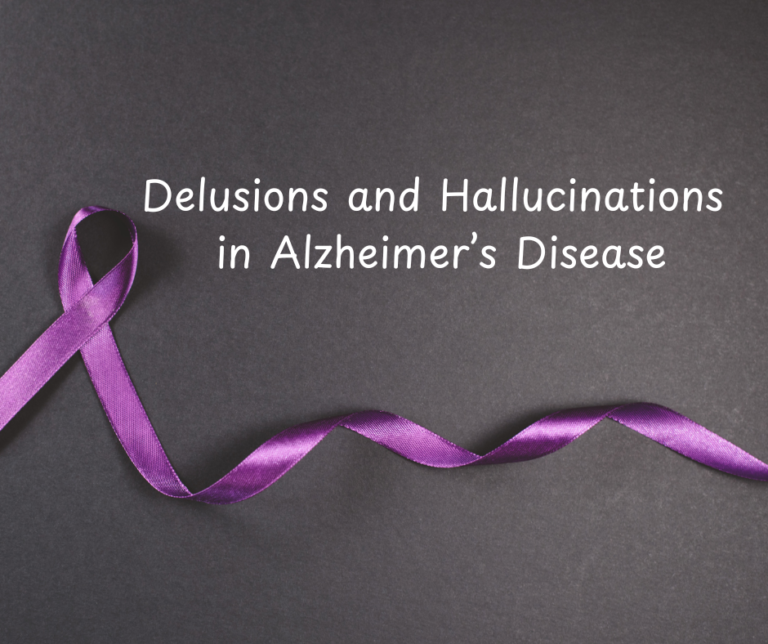Understanding Delusions and Hallucinations in Alzheimer's Disease

Alzheimer’s Disease is a progressive neurodegenerative disorder which is widely recognized for its impact on memory, cognition and behavior. Beyond these common symptoms, individuals living with Alzheimer’s may also experience delusions and hallucinations. These two symptoms can significantly affect quality of life and complicate caregiving. In this blog, we will review important factors that will improve your understanding of delusions and hallucinations in Alzheimer’s Disease.
What are Delusions?
Delusions are false beliefs that are held with strong conviction despite evidence provided to suggest the truth. The person living with Alzheimer’s may believe that their caregiver is stealing from them, or that a dear loved one is still alive although they passed many years ago. Delusions can cause frustration and animosity for the caregiver as their attempts to orient to reality are not successful.
What are Hallucinations?
Hallucinations involve sensing things that aren’t actually present. Hallucinations can be visual, auditory or tactile. Someone living with Alzheimer’s may see people or objects, they may hear voices or someone speaking to them, or they may feel something touching them, when in fact, they aren’t really there. Hallucinations can be quite frightening for the person experiencing them and challenging for caregivers to manage.
Causes
As plaques and tangles begin to form in the brain and destroy brain cells, they move from one area of the brain to the other, eventually landing in the areas that control logical thoughts and sights and sounds. This is when delusions and hallucinations can occur.
The environment can sometimes trigger these symptoms as well. A poorly lit room or an unfamiliar setting can cause someone with Alzheimer’s to misinterpret what is heard or seen. Some medications can have a side effect that contributes to hallucinations or delusions. Hearing loss or vision changes can result in the brain’s tendency to fill in gaps with false perceptions.
Impact on Individuals and Caregivers
Both delusions and hallucinations can place a significant emotional and physical burden on caregivers. It can cause feelings of helplessness and stress. Caregivers must understand that these symptoms are part of the disease process and not something the person can control. It’s easy to take comments personally, especially when your loved one might say that you don’t have their best interest in mind, when you know you are doing everything you can to help. Learning patience, empathy and a calm approach will help navigate these challenging situations.
Strategies for Managing Delusions and Hallucinations
Do not argue: Instead of attempting to convince someone that their beliefs are not real, validate their feelings. For example, “I believe that you see a man standing in the room. Are you afraid of him?”. This will help determine if the hallucination is causing fear or anxiety for your loved one, and you are validating this experience is real for them. Further response depends on their perception of the hallucination. Attempt to redirect them to another topic or engage them in an activity.
Remain calm: Respond in a calm manner with a soft voice. Reassure your loved one that they are safe, and you are there to help. If your loved one is delusional and saying that you stole their money, rather than getting defensive, say “Mom, let me help you find the money you are missing. Where was it and how much is missing?” This shifts the conversation from a sense of blame to a sense of partnership in solving the problem.
Monitor episodes: Track the frequency that delusions and hallucinations occur, as well as the time of day. Identify any patterns or activities that may be related to the events and attempt to minimize the triggers. You can implement a behavior calendar which is an easy way to add a tally mark for each episode that is documented into sections for morning, afternoon, evening, and night.
Consult with a healthcare provider: If delusions and hallucinations in Alzheimer’s Disease are affecting quality of life for your loved one, it’s best to consult with the healthcare provider. Medication or other interventions may be effective in managing these symptoms.
Conclusion
It’s critical for caregivers to seek resources for understanding delusions and hallucinations in Alzheimer’s Disease. By gaining knowledge about these symptoms and implementing strategies to manage them, caregivers can provide better support to their loved ones. This will develop a more peaceful and reassuring environment. Remember, you’re not alone in this journey. Contact your healthcare provider, join a support group, or tap into other resources in your community for guidance.
If you’re caring for someone with Alzheimer’s and need assistance, consider consulting with a dementia care expert like Dementia Nurse Andrea at Wellness Strategies Group. With decades of experience in dementia care, Andrea can offer compassionate, expert support to help you navigate these challenges. Contact Andrea today.
Follow Dementia Nurse Andrea
for tips, tools, and expert insights to support your dementia care journey - free every day!
